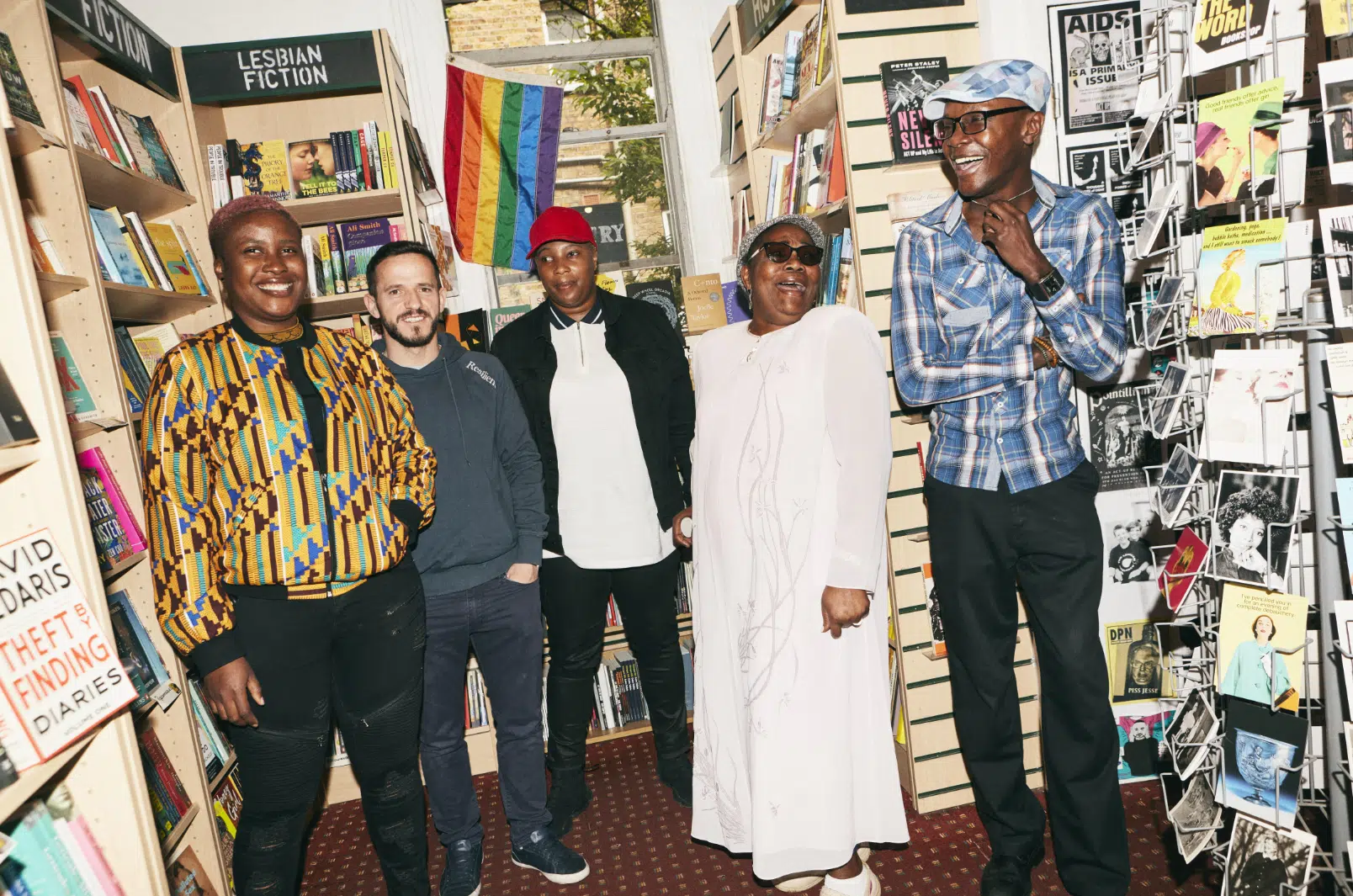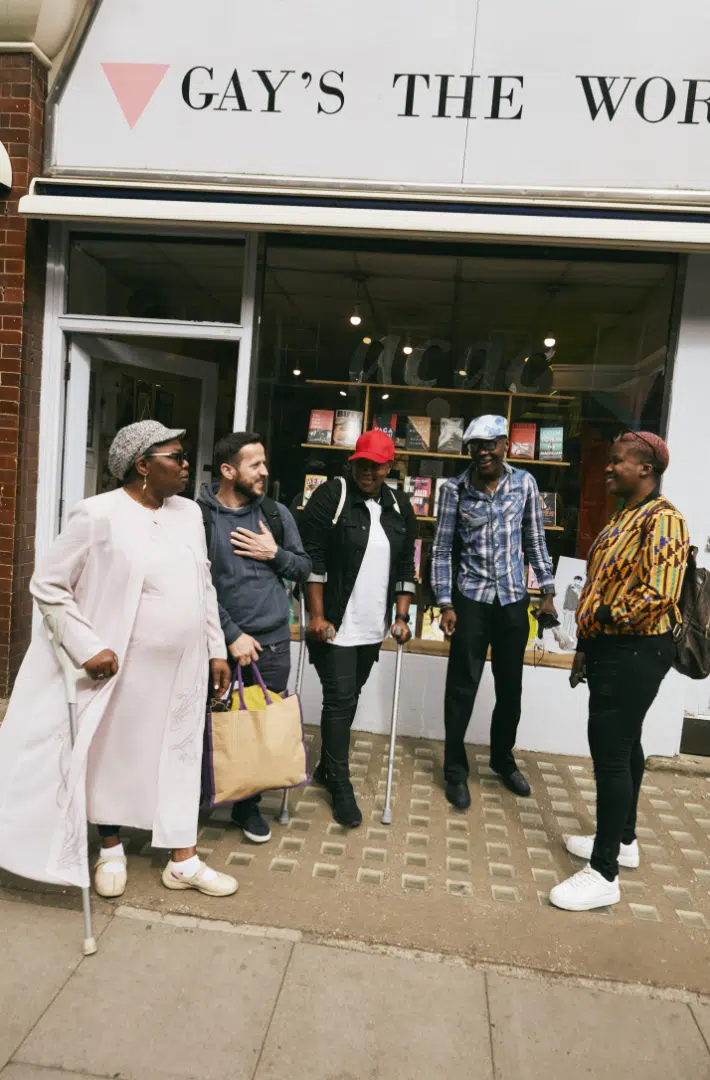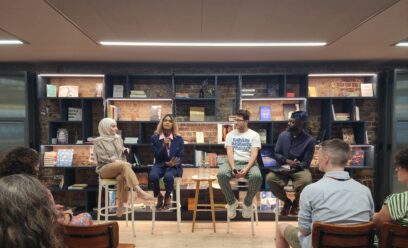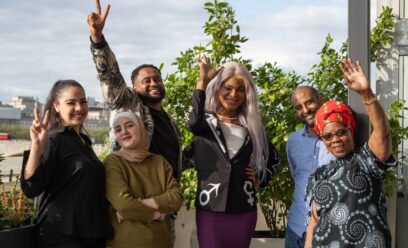This Pride season, IMIX and Rainbow Migration highlight LGBTQI+ people seeking safety from violence and persecution – #PrideInSeekingSafety
Posted by Ahmed Elmi on June 22, 2022
Credit: IMIX/Kasia Clark
#PrideInSeekingSafety
“I am now happy that I do not have to defend myself for simply being myself.”
To celebrate Pride month, we invited five queer sanctuary seeking people to the world-famous Gay’s The Word bookshop in London’s King’s Cross, to highlight the importance of safe spaces for queer people, and to raise awareness about the plight of LGBTQI+ people who have refugee status around the word. There are still almost 70 countries in the world where it is against the law to publicly identify as LGBTQI+, including roughly 70% of the Commonwealth countries associated with the British Crown. This has sadly resulted in many lesbians, gay, bisexual, and trans individuals having to flee their own countries in order to seek safety.
LGBTQI+ Asylum in the United Kingdom
Of the handful of countries around the world that allow queer people to seek asylum, the United Kingdom is one of them. However, many queer people experience anti-LGBTQI+ hostility in the UK asylum system. For example, there have been vast reports about the procedures queer people are put through when they claim asylum, including humiliating ‘tests’ to see if they are, in fact, homosexual or bisexual, with ‘flamboyancy’ in gay men being used as credible way to discern their sexuality, in some cases. It has been said that there is a ‘culture of disbelief’ in the system when it comes to LGBTQI+ people seeking asylum, as 4 in 10 claimants say that their cases are outright rejected on the basis that they cannot ‘prove’ that they are lesbian, gay, bisexual or trans, or that their life was in danger before they fled. This will further increase as Clause 31 of the Nationality and Borders Bill comes into effect, as it raises the ‘standard of proof’ for queerness.
In recent months the threat to LGBTQI+ asylum in the UK has proved to be even more precarious, with the threat of deportation and detention increasing, as the Government’s Rwanda offshoring scheme becomes a dangerous risk for LGBT people seeking safety in this country. As many campaigners have pointed out, ‘ill treatment’ of LGBT people in Rwanda is still rife.
LGBTQI+ Ambassadors
The ambassadors in this campaign each have a unique experience of the system, as well as escaping some harsh realities in their respective home countries. From fleeing family and community violence to sleeping rough on the streets and being placed in detention, these resilient queer people have a story worth telling. One that reacquaints us with the original ethos of ‘Pride’ and why it still resonates in 2022.
D is from Nigeria and now lives in Middlesbrough
“Back home in Nigeria you cannot imagine to be public about your life as an LGBT person. You live in hiding. When people find out what you are, or who you are, your life begins to become difficult.
I am proud to be myself. No one can tell me who I am, or what I have experienced.”

D. Credit: IMIX/Kasia Clark
Jason is from Trinidad and Tobago and now lives in Doncaster
“I came to the UK in 2014, fleeing violent homophobia in my country. Living openly in Trinidad and Tobago is not easy, there are routine killings of homosexual men and women, as well as transgender people.
I am now happy that I do not have to defend myself for simply being myself.”

Jason. Credit: IMIX/Kasia Clark
Hamez is from Albania and now lives in Newcastle
“When my parents found out that I was gay, my father chased me out of the house with an axe. I had brought shame on my family, and then my father began to be physically abusive.
I was born as a gay person, and I wear that with pride.”

Hamez. Credit: IMIX/Kasia Clark
Nessakem is from Nigeria and living in Manchester
“I came out to my mum, she said horrible things to me, my friends from back home sent me mean texts as well. At this point, I knew it was not safe, I sought advice from Citizen’s advice, and I was told to apply for asylum.
It was a struggle but I’m glad that I can proudly say I am a lesbian woman and be at peace with myself.”

Nessakem. Credit: IMIX/Kasia Clark
Sheila is from Zimbabwe and lives in Selby
“It is not safe at all in Zimbabwe. There are raids and arrests that happen all the time. You must live in fear, in secret and hide. How long can someone be hiding?
I am proud of who I am, and I am proud to be a lesbian.”

Sheila. Credit: IMIX/Kasia Clark
Pride
Despite the extreme obstacles still facing LGBTQI+ people around the world, it is important to never lose sight of the original purpose of Pride: to promote the dignity, equality and visibility of queer people. And although many of the fights for queer liberation have been won for the citizens of the United Kingdom, we should never neglect those that are most vulnerable and in need of our support.
Gay’s the Word
Gay’s the Word is the oldest queer bookshop in the United Kingdom that was founded in 1979 in London’s Bloomsbury, near King’s Cross. It is a historic place for the Gay Liberation Movement in the UK, as many activists groups in the early days of the fight for queer rights took meetings inside the bookshop, including the famous Lesbian and Gays Support the Miners. Historically, it has often been one of the first places many queer people visit as they migrated to London from other parts of Britain and across the world.
“Queer migration is a part of our history, and we endeavour to be a safe welcoming space and to serve as a beacon to those coming from cultures where it is not easy or possible to be who you are.”
Jim MacSweeney, Manager at Gay’s The Word Bookshop

Credit: IMIX/Kasia Clark
Rainbow Migration
LGBTQI+ people that seek safety in the UK have had to flee violence and persecution in their countries of origin. Once they get here, they expect to feel safe and to have a chance to rebuild their lives free from violence. However, instead of that, most of them encounter a long and often cruel asylum process in which their sexual orientation and/or gender identity is called into question. It also sends them to temporary accommodation and detention centres where they can face further abuse and isolation.
“As the government is trying to rid itself of its responsibilities by passing the Nationality and Borders Act and by sending people seeking safety in the UK 4,000 miles away to Rwanda, unknown numbers of LGBTQI+ people are being held in immigration detention, not knowing their fate. They are detained without courts or judges, in prison-like conditions, and for unlimited amounts of time.”
Qussai Ramzi is a member of Rainbow Migration’s Campaigns Advisory Group
Rainbow Migration supports lesbian, gay, bisexual, trans, queer and intersex (LGBTQI+) people through the asylum and immigration system.
Support
Rainbow Migration gives free and confidential legal advice to LGBTQI+ people seeking asylum. They also provide emotional support to those who are going through the asylum process and help them with accessing housing and health services. If you need support, please get in touch.
LGBTQI+ people fleeing persecution are scared and need Rainbow Migration’s services more than ever. Can you make a donation to support someone seeking asylum? £5.50 pays for someone to attend one of our support groups, £15.70 pays for an hour of one-on-one support
If you’d like to learn more about the work that Rainbow Migration does, feel free to subscribe to their newsletter.
Add your name to call for an end to LGBTQI+ detention here: Handraiser



